Excerpts from A Mormon Story, installment 8
Stephen Stone, RA President
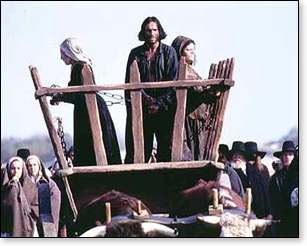 We now present the last installment in our series of excerpts from A Mormon Story.
We now present the last installment in our series of excerpts from A Mormon Story.
Sometime after the November election, we'll undertake to add the final chapters of the book — still unwritten.
Installment 8 deals with the incredible insensitivity, and bureaucratic cruelty, with which high LDS leaders continued to heighten their abuse of the Stone family.
It's human nature at its worst — as might be expected from an ecclesiastical culture in which imperfect leaders are given to believe their thoughts and actions automatically reflect the mind and will of God solely by virtue of their callings, a notion unsupported by LDS scripture, but popular in the Mormon church nonetheless.
Read on.
The bottom-line reason?
Not only was the site confidential and non-public, as far as its audience, but it was literally private property — not the possession or jurisdiction of the church, which had no doctrinal or legal right to demand its closure, or otherwise usurp control of it by threat or other inducement. Steve justifiably believed the church overstepped its rightful interest in the site by unreasonably requiring it be shut down over the remote possibility someone might stumble upon it, even though Ethan made it undiscoverable.
The site was invitation-only — designed solely for a handful of church leaders, in the hope of persuading them to end the church's unceasing persecution of the Stones. Leaving it down — without any good-faith reciprocity by the church — meant willfully allowing the church to take over the site, as well as dictate the Stone family's rightful choices.
Them's fightin' words to someone who believes in the God-given rights, freedoms, and responsibilities upon which our nation was founded. As stressed before, the church's unwarranted intrusion into the Stone family's lives has been un-American in principle from the start — disrespectful of their right to choose their own lawful options. That was especially true of the church's attempt to control the family's website in the face of no credible claim of harm to the church incurred by the website's existence.
Meanwhile, Steve inadvertently discovered that DeeAnn had invited the ward's last bishop to the wedding reception — to be held the evening of the temple marriage in the stake center's large "cultural hall."
Because Steve was planning to perform several musical numbers with a longtime friend who'd had a career as a professional singer, he told DeeAnn he couldn't possibly sing — something Steve does from his heart — with the seriously unkind bishop sitting in front of him, reminding him by his very presence of the family's unjust exclusion from Abbey's wedding.
So Steve and DeeAnn went to the bishop's office at the stake center on Sunday evening, July 12, and found him still there.
Steve politely explained his desire not to be distracted by the bishop's attendance at the reception since Steve would be performing with his musician friend. He tried to avoid being confrontational or disrespectful — just let the man know the untenable nature of his attendance, under sensitive circumstances that should be self-evident.
The man was angry — angry enough to raise this "disinvitation" at Steve's excommunication trial three months later when he testified against Steve.
Steve's straightforward words set the man off, and among other intentionally antagonizing insults, the bishop said derisively, "You don't sustain anybody" when voting at church — when in reality Steve had only voted against him and few others who'd been repeatedly abusive toward the Stones.
As always, he refused to accept Steve's explanation of his basis for voting, as though he understood it more fully than Steve, and refused to acknowledge the family's belief that these men had not been properly sustained (since the family's votes had been repeatedly ignored) — and thus they had no right to conduct church business, as far as the Stones were concerned.
Steve told the man his disrespectful, judgmental behavior was unworthy of his office — making clear he didn't appreciate being maligned by a man who'd unjustly set in motion the destruction of the family's happiness on the occasion of Abbey's wedding.
At one point, the bishop walked in front of his desk and pushed his frame tauntingly within inches of Steve's, as though he was going to give him a chest butt. Steve stood motionless, while DeeAnn watched.
The man then walked past Steve and out the door of the adjoining clerk's office, unlocked his office door from the outside, and reentered the room.
Steve summed up what he thought of such immature antics — the worst he'd ever seen by a bishop — and left with DeeAnn.
On July 18, Steve sent a four-page statement protesting the bishop's behavior to the stake president.
Further meetings
The more DeeAnn and Steve met with the stake president, the more disturbing their encounters.
What started as a superficial conversation about the Stone family — with no mention of the family's struggles at the hands of church leaders, or their possible remedy — turned into an escalating exercise in futility, as the president repeatedly revealed his ulterior motives, ignored the family's witness of continual wrongdoing against them by church leaders, and ultimately countered their every entreaty, behaving heartlessly in doing so.
Since he was acting under the direction of the presiding Brethren, the whole demeaning process spoke ill of their methods and lack of simple Christian decency.
Pulling strings at the heart of the "negotiations," it was evident from things the stake president revealed, was the Senior President of the Seventy, the former Huntsman executive, whose insensitivity appalled the Stone family.
As the meetings increasingly resembled a growing web of deceit, the stake president — obviously feeling insulated from accountability because he was "on the Brethren's errand" — told Steve and DeeAnn outright lies, as he sought to induce them against their will to conform with high leaders' undoctrinal demands.
The game the president played caused Steve and DeeAnn to lose any respect they exhibited at the outset toward him. He turned out to be, in some ways, a more devious personality that his predecessor.
He was in fact ruthless in implementing the Brethren's guidelines and wishes, and under his watch, the suffering of the Stones multiplied.
As an indication of the man's obvious bad faith, he wrote down any statement Steve made that could conceivably be used against him in the disciplinary council he was secretly planning — such as Steve's belief that church leaders were not automatically called of God or inspired of Him by virtue of their calling; or his insistence that members were under no doctrinal duty to support any particular church leader, no matter how high up, if that leader flagrantly violated church law; or his view that the temple recommend question requiring "sustaining" of all church authorities, local and general, was at odds with the church's canon, and disregarded members' right to vote their conscience under the Law of Common Consent.
The fact that everything Steve said in these interviews was in harmony with official church doctrine was incidental to the president. As evidenced by his cleverly-worded questions, he was on a mission to discredit Steve. To this man who was by all indications a "cultural Mormon" — steeped in undoctrinal myths, traditions, and norms — Steve's scriptural perspective appeared heretical.
In the end, the meetings deteriorated for the Stones into exasperating conversations with a blank-staring brick wall.
A follow-up letter of protest
On July 18, Steve sent a follow-up letter to the stake president, relating his concerns after another of his and DeeAnn's encounters with him.
The letter appealed to the president to faithfully follow the laws of God and the church in his dealings with the family — something Steve felt the president was disinclined to do.
After citing passages of LDS scripture that emphasized the need to obey divine law if God was to be pleased, Steve asserted,
The Senior President's secretary said, "You need to work with your stake president and bishop," ending virtually all hope for the family to attend Abbey's wedding.
Manipulative reprimand by the stake president
Away on family business, the stake president emailed a condescending, indignant letter to Steve dated July 21, in response to Steve's attempt to arrange an appointment with the Senior President, which presiding authorities informed him of.
The tone was cold, manipulative, and immature; and the substance illogical, unfactual, and insulting to Steve's intelligence.
The letter read like a stern — if absurd — reproof of a wayward child by an overbearing parent. (Note that in Mormon culture, church leaders are often seen as parent figures.)
It was as though the president hadn't even read or seriously considered Steve's letters — written earnestly in the hope of resolving the "church problem" for the benefit of his family.
To Steve, the most disturbing thing about the president's reprimand was its misuse of LDS scripture.
The few scriptures the president used to support his rebuke were irrelevant to their application, as though he simply looked them up in the church's "Topical Guide" as he wrote his chastisement of Steve, and had little appreciation of their meaning.
For instance, his scriptural evidence that Steve needed to "do" what the president demanded of him was a phrase in the middle of D&C 84:54-60 — which is about the need for church members to believe the saving doctrine of Christ and live it, so God's "condemnation" of the "whole church" might be lifted. The president took entirely out of context the words "not only to say, but to do according to that which I have written," to justify his controlling behavior toward Steve in their interviews, and to condemn Steve for not obeying him.
Such "wresting" of scripture for the purpose of controlling another person's will is unChristlike.
In another part of his letter, the president cited a familiar passage in Alma 5 that appeals to church members to become "spiritually born of God" — though obtaining a "mighty change of heart" by the power of the Holy Ghost — and used the passage to support his presumption that Steve needed to "strip away pride" because of his refusal to conform to the president's will.
The president used three other passages from the Book of Mormon to assure Steve that if he would "repent" of the "iniquity" of charging errant church leaders with wrongdoing, he might "begin with a clean slate" and be "healed" by the atonement of Jesus Christ.
Such disrespect for Christ's atonement — in utter disregard for LDS law and doctrine — is repugnant.
In each of these last three passages, the focus is on how a person guilty of serious violation of scriptural standards can be redeemed and converted by "the power of Christ unto salvation." The president trivialized the saving gospel by suggesting that Steve's disobedience to the president indicated he was unredeemed, unconverted, and in need of spiritual "healing."
Typical Mormon authoritarianism, nothing out of the ordinary.
Other unsound notions in the president's letter
The president's message centered in the need for Steve to "make progress" by setting aside his "unfounded accusations" against church leaders, an obsession the president suggested was caused by Steve's tendency "to lay blame on others" due to "perceived offenses from the past" that had no basis in fact.
Accusing Steve of damaging their "progress together" by seeking to meet with the Senior President, the stake president condescendingly chided Steve as he would one of his own misguided children, saying they were now hindered in "working on substantive areas [needed] in order to see progress happen."
Shades of word games from old Newhart re-runs: euphemistic manipulation by someone steeped in behaviorism.
Because Steve attempted to sit down with the Senior President and finally — after nine years — make real progress, the stake president therefore wrote, "The path we had embarked on in the June 24 and July 8 meetings had been detoured."
Nonetheless, "I maintain an open mind and great hope," he said, "that you will be willing to make certain changes in your attitude and conduct" (emphasis added), as though he were taking notes next to a patient on a couch.
And so on — implicitly foreshadowing dire consequences if Steve refused to comply.
The president then focused on his claim that "substantive discussion is made more difficult by accusations [you have made in writing] that I have punished your family for unwillingness to sustain leaders" — and he said he was hopeful "we will be able to put aside the distractions and focus on . . . real issues, but that will happen only if you are . . . willing to alter your conduct" to conform with church leaders' demands regarding "sustaining" them (emphasis added).
Since Steve was not willing to "change," the president said, "I do not foresee the temple recommend or permission for ordination [of your sons] being given [in] time" for Abbey's wedding.
He added "there is simply not enough time" for Steve to be persuaded to alter his thinking.
Regarding the matter of "sustainings," he said,
He then said, not realizing the absurdity of his statement:
It's also absurd because it suggests there are somehow unavoidable, inherent consequences for voting one's conscience — when in reality any such consequences, in the context of the church, are man-made, and man-inflicted.
It is therefore not a matter of "not shield[ing] you from those [unavoidable] consequences," as the president claimed, but of threatening to impose those consequences at his very hand in retaliation for negative voting.
Such dishonest, controlling behavior is an affront to God — the purported author of the principle of "consent of the governed" at the heart of the Law of Common consent, as well as of the American political system.
And that principle implies a right — not merely a freedom.
The very premise of the president's letter of rebuke is thus an absurdity on its face — wholly illogical and ridiculous.
The president ended by falsely accusing Steve of "acrimony and bad feelings" toward church leaders (feelings Steve has carefully avoided, opting to forgive but hold church leaders to account while they continue their abusiveness) — and he invited Steve to be "healed" by Christ's atonement for his efforts to persuade his leaders to stop threatening and intimidating his family.
The nonsensical letter is a metaphor for all that is wrong with the church's mistreatment of the Stones.
The letter protested the "conduct of [the stake president] in this difficult and sensitive matter" and stressed the president "has ignored the laws and doctrines of the Church [and] been less than forthright and honest in revealing his agenda, motivation, and purpose in meeting with us."
In fact, Steve wrote,
Additional letter to the Senior President
The same day, July 23, Steve sent a second letter to the Senior President of the Seventy, in which he described in detail the stake president's unacceptable behavior toward the Stone family and asked for "urgent action" by the Senior President in behalf of the family.
After saying "I understand that you've asked our stake president . . . to act as a go-between in bringing this conflict to an end," Steve wrote,
All three are things the Stones have requested of the president from the outset of their conversations with him, and he has turned all three down without hearing the family out.
In fact, Steve wrote, the president has relied on the advice and perspective of the bishop to dictate the outcome of the matter — ignoring the fact the bishop was, at that time, the foremost cause of the controversy.
Instead of pursuing reasonable avenues of resolving the matter, the president — Steve said — has
"As an alternative," Steve said, he would appreciate "a written statement from you denying our family's God-given right to vote our conscience in this matter, and defending the Church's 'practice' of barring worthy members from the temple who similarly vote their conscience."
As before, Steve heard never back from the man.
Denial by the stake president
On July 26, the stake president sent Steve a brief letter saying he had been forwarded a copy of the above July 23 letter (which was attached to Steve's other letter of the same date) addressed to the Senior President of the Seventy, and that the First Presidency's Office had instructed him to respond.
In a terse, carefully-worded statement, the stake president told Steve:
That is inherent in his declaration that he was "not aware of credible evidence of wrongdoing by any other church leaders, including Bishop [deleted]." The only reason he could make such a claim was that he had unjustly refused to allow the Stones to present their considerable evidence — accumulated over nine years — of serious misconduct, even cruel persecution, against them by a handful of church leaders.
He told Steve and DeeAnn more than once in their meetings: "I'm not interested in investigating your claims."
Such refusal would not necessarily be a problem were it not for the fact the president felt entitled to judge the family's allegations to be false without a valid basis in the facts.
According to LDS tradition (with scant scriptural basis), stake presidents — like bishops — are designated as "common judges," acting as "judge[s] in Israel, to do the business of the church, to sit in judgment upon transgressors upon testimony as it shall be laid before [them] according to the laws [of the church]" (D&C 107:72, 74, emphasis added).
Similarly, D&C 58:18-20 stipulates that "a judge in Israel" is "to judge his people by the testimony of the just, . . . according to the laws of the kingdom. . . ."
The "laws of the kingdom" require disciplinary judgment to be based on the testimony of reliable witnesses. Deuteronomy 19:15-20 — the first such reference in scripture — emphasizes that "judges shall make diligent inquisition" into serious disputes laid before them in which it is apparent that one or more claimants is a "false witness" who is testifying "that which is wrong."
It is clear from this definitive passage that judges are to ascertain who is telling the truth by hearing both sides. There can be no presumption of innocence or guilt without "diligent inquisition" into the matter on the basis of sufficient testimony.
This principle of fairness and equity by judges is reiterated in D&C 102 — which plainly directs that both the accuser and the accused are to have adequate opportunity to present their "evidences," and that those high councilors participating in a disciplinary council are to see that "the evidences and pleadings" are heard "impartially," to ensure "the evidence is examined, in its true light, . . . according to equity and justice" (verses 16, 18, and 20).
The intent of such passages is unmistakable: a judge in the church is to be fair-minded, not favoring either side of a serious controversy placed before him.
Yet the stake president unjustly ignored the Stone family's pleas for such fairness — pleas that asked merely for the opportunity to substantiate their claims against those who persisted in harming them.
Instead, he listened only to one side — the side of those accused of serious mischief — and formed firm conclusions, violating his duties as a "common judge" in doing so.
In other words, he's acted as a false judge by dismissing out of hand the family's charges of continuing persecution, intimidation, and unlawful interference with their lives and work by several church officials — even though the family can prove these charges to any objective review.
Of course, the reason the president concluded the Stones' charges were false on their face was that the previous stake president, under whom he served a year as a counselor, had misinformed him of the facts and prejudiced him against the Stones, much as that compulsive man had done with the current bishop — who has never taken any interest in understanding the family's ordeal, and has no real knowledge of the controversy, having been told by the former president to "ignore the Stones."
This is all indefensible under church doctrine and law.
The new stake president cannot justly be charged with "dereliction"? The Stones would disagree.
Steve's candid response
And they did disagree.
In a letter dated July 29, 2009, just two days before Abbey's disappointing wedding, Steve sent the stake president a forthright response.
He began by pointing out that his July 23 letter was not addressed to the stake president, but was "directed solely" to the Senior President of the Seventy — as well as the First Presidency, who were given a courtesy copy —
On July 31, 2009, the Stone family gathered at the Timpanogos LDS Temple in American Fork, Utah, and waited outside while Abbey and Andy were married. It was a difficult time for family members — who were again denied entrance to the wedding for no valid reason under church doctrine.
As they walked through the large parking lot on their way to the temple grounds, the family ran into their longtime friend and political colleague, Gov. Gary Herbert, and his wife Jeanette. Steve said, "There's a nasty rumor out there that you're the new governor of Utah," and Gary laughed. (At the time, Gov. Jon Huntsman was being confirmed by the Senate to become U.S. ambassador to China, and Lt. Gov. Herbert was slated to be sworn in as governor within a matter days.) Steve said the family had come for the wedding of their daughter Abbey — without mentioning that the family wouldn't be allowed to attend.
A large group of extended family emerged from the temple an hour later with the new bride and groom, and everyone posed for numerous formal photos outside the temple, then had lunch under a nearby canopy. Steve — and other family members — did their best to hide their deep hurt and anguish at the incredibly callous treatment they'd received on this special occasion from a church that claims to value families, as well as the institution of marriage, yet would so cruelly punish a family "guilty" of nothing more than voting against abusive church leaders — as is their God-given right under church law — when asked to express their approval or disapproval of these men.
"Families can be together forever" is a popular (if undoctrinal) slogan in Mormondom. How about being allowed to be together at the creation of a new family from an existing one?
Words like hypocrisy, fraud, and misrepresentation come to mind — as well as cold-hearted self-protection by bureaucratic church leaders.
That evening, Steve and his longtime professional musician friend performed several numbers at the reception, followed by a few organ solos by DeeAnn on the stake center's European-style tracker organ. DeeAnn, who had served 15 years as ward organist before being summarily dropped for siding with Steve when the church controversy began to unfold, hadn't touched the one-of-a-kind instrument since that time.
The three Stone sons also performed with their dad — and Ellery stunned everyone with a solo rendition of Coldplay's "The Scientist" that rivaled the original by lead singer Chris Martin. It was Ellery's first-ever public musical performance.
2 See "Top 10 Conservative Web Sites," About.com (http://usconservatives.about.com/od/conservativepolitics101/tp/Top-Conservative-Web-Sites.htm)
3 See Appendix: "An Address: The Church of Jesus Christ of Latter-day Saints to the World," April 1907
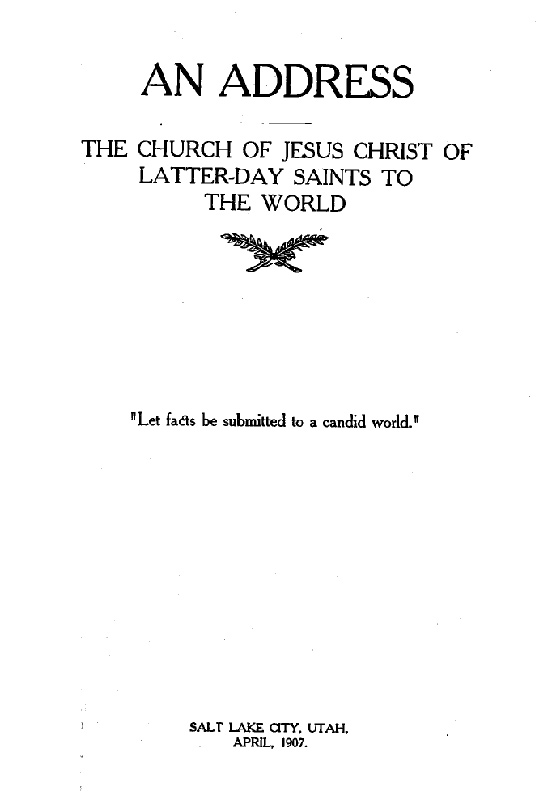

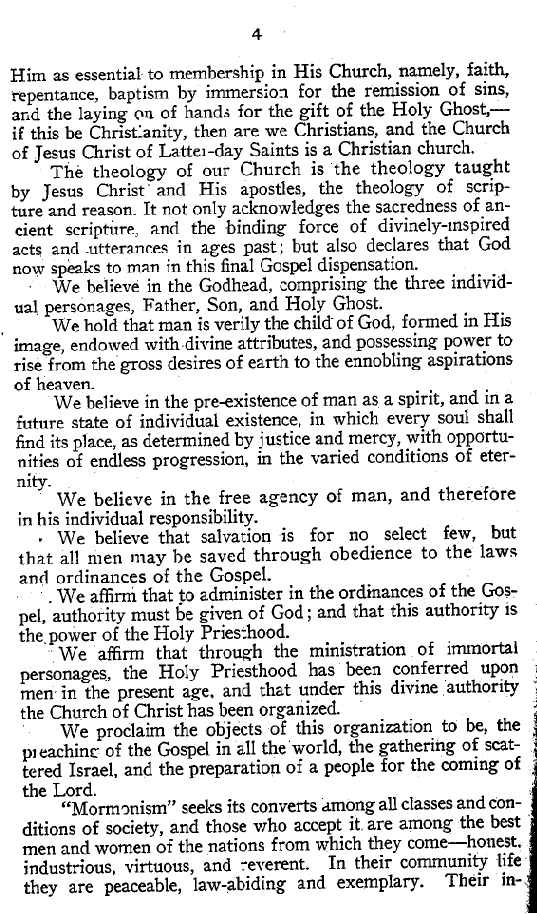
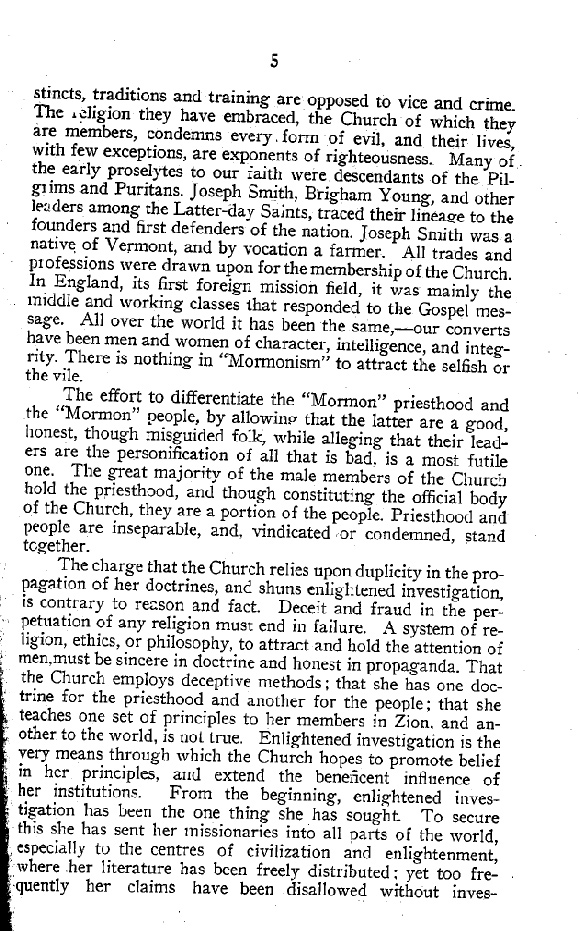
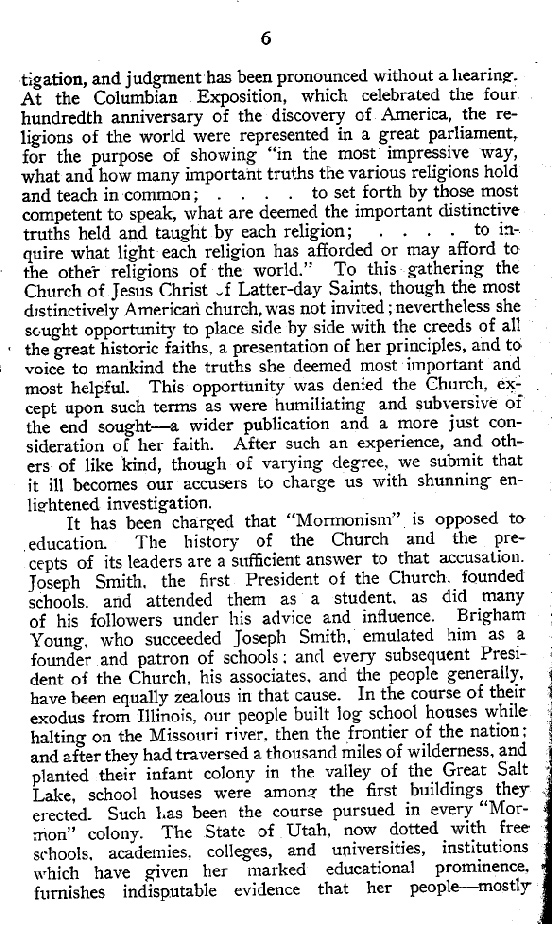
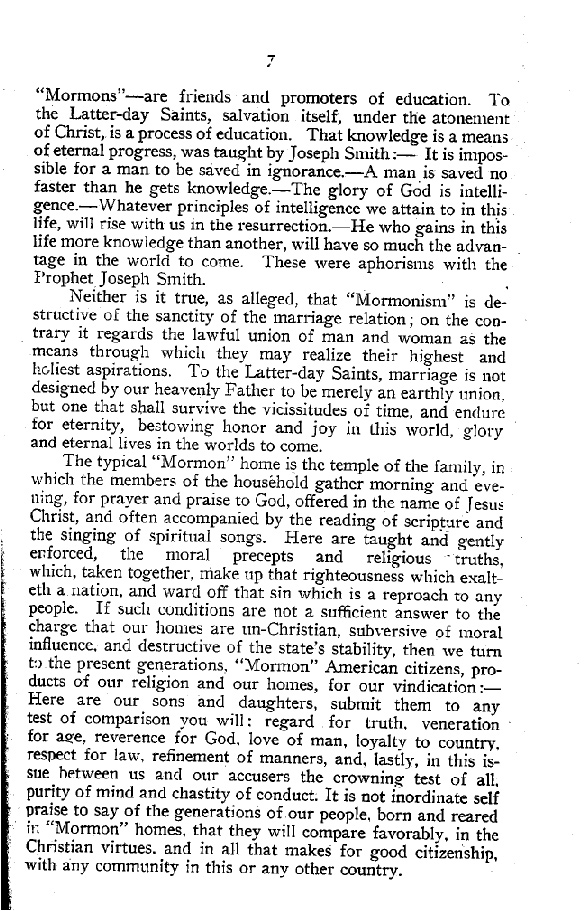
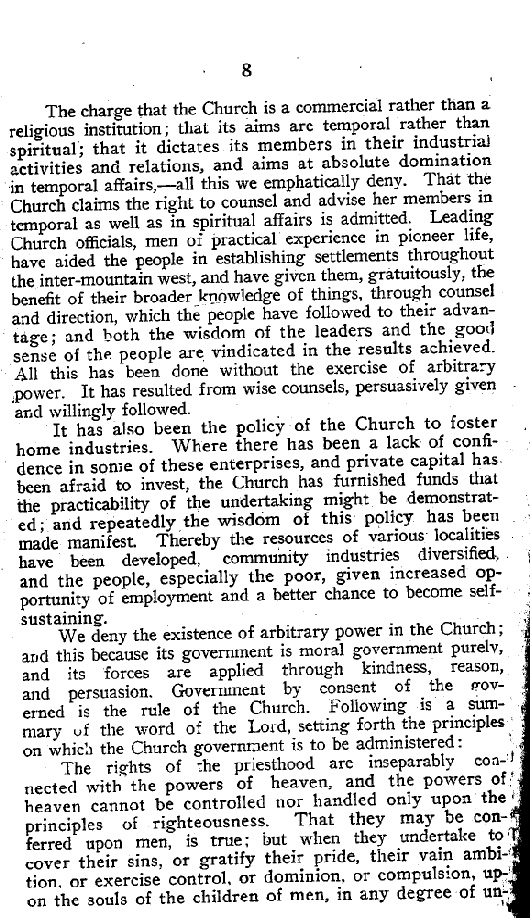
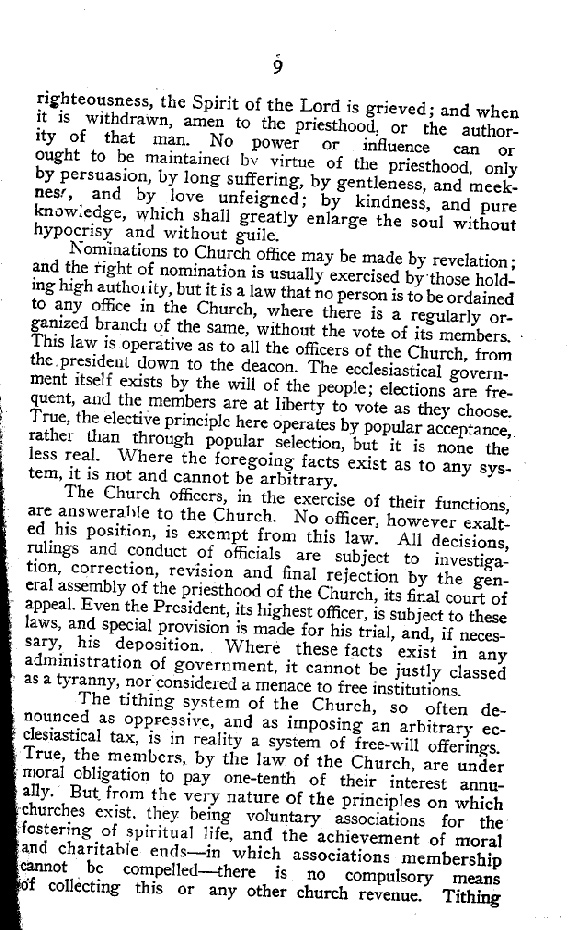
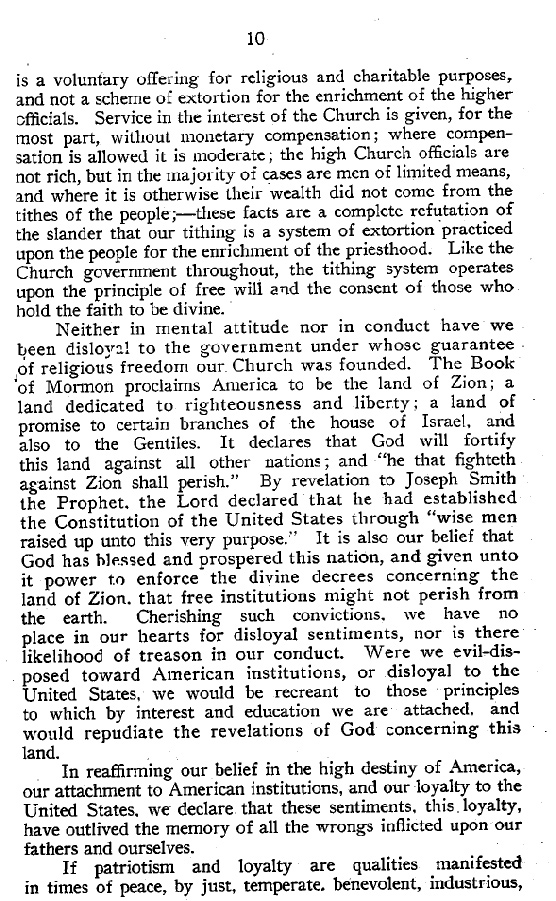

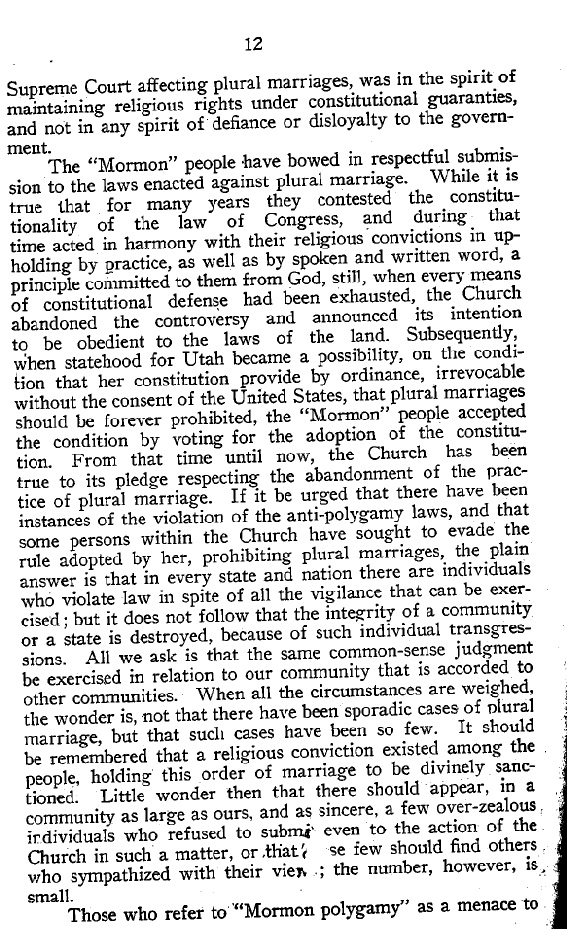
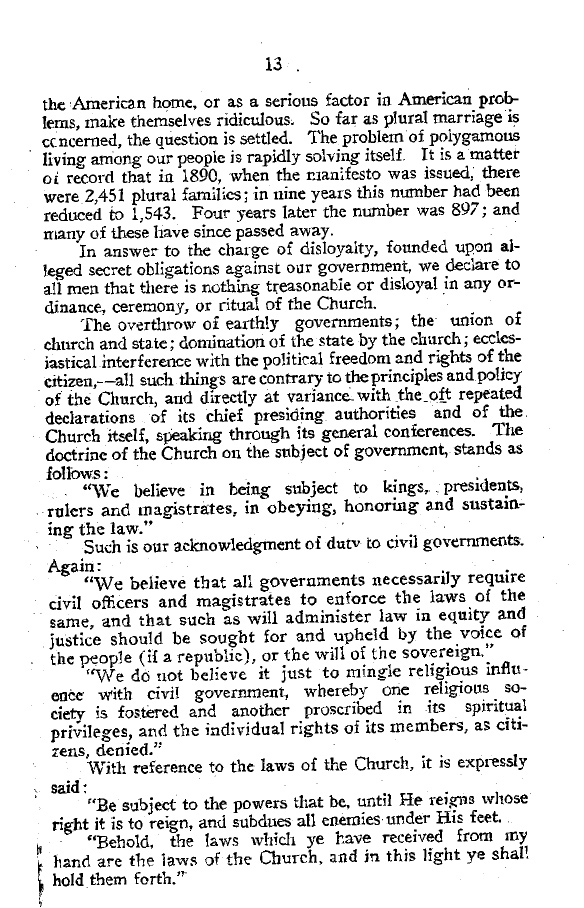
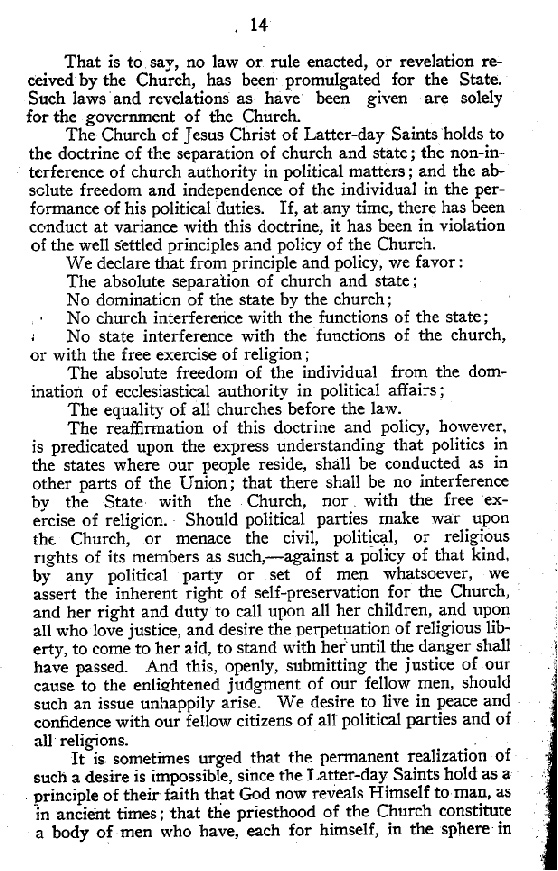
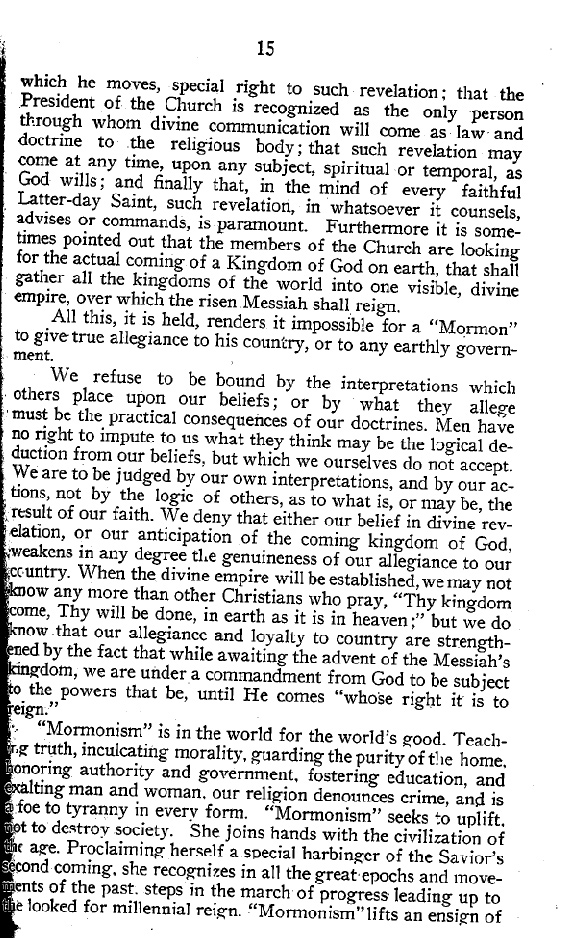
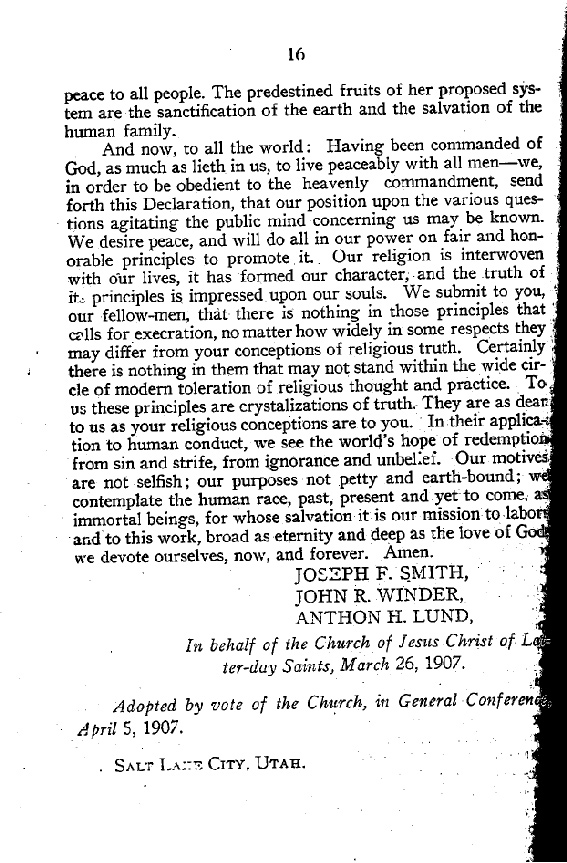
 "Excerpts from A Mormon Story, installment 1"
"Excerpts from A Mormon Story, installment 1"
 "Excerpts from A Mormon Story, installment 2"
"Excerpts from A Mormon Story, installment 2"
 "Excerpts from A Mormon Story, installment 3"
"Excerpts from A Mormon Story, installment 3"
 "Excerpts from A Mormon Story, installment 4"
"Excerpts from A Mormon Story, installment 4"
 "Excerpts from A Mormon Story, installment 5"
"Excerpts from A Mormon Story, installment 5"
 "Excerpts from A Mormon Story, installment 6"
"Excerpts from A Mormon Story, installment 6"
 "Excerpts from A Mormon Story, installment 7"
"Excerpts from A Mormon Story, installment 7"
October 29, 2012
 We now present the last installment in our series of excerpts from A Mormon Story.
We now present the last installment in our series of excerpts from A Mormon Story.Sometime after the November election, we'll undertake to add the final chapters of the book — still unwritten.
Installment 8 deals with the incredible insensitivity, and bureaucratic cruelty, with which high LDS leaders continued to heighten their abuse of the Stone family.
It's human nature at its worst — as might be expected from an ecclesiastical culture in which imperfect leaders are given to believe their thoughts and actions automatically reflect the mind and will of God solely by virtue of their callings, a notion unsupported by LDS scripture, but popular in the Mormon church nonetheless.
Read on.
Chest butt, anyone?
Not long after sending the previous letter, and after being condemned for it by the stake president, Steve and Ethan re-activated the family's confidential website — refusing to be bullied by an overly-controlling, overly-image-minded LDS church.The bottom-line reason?
Not only was the site confidential and non-public, as far as its audience, but it was literally private property — not the possession or jurisdiction of the church, which had no doctrinal or legal right to demand its closure, or otherwise usurp control of it by threat or other inducement. Steve justifiably believed the church overstepped its rightful interest in the site by unreasonably requiring it be shut down over the remote possibility someone might stumble upon it, even though Ethan made it undiscoverable.
The site was invitation-only — designed solely for a handful of church leaders, in the hope of persuading them to end the church's unceasing persecution of the Stones. Leaving it down — without any good-faith reciprocity by the church — meant willfully allowing the church to take over the site, as well as dictate the Stone family's rightful choices.
Them's fightin' words to someone who believes in the God-given rights, freedoms, and responsibilities upon which our nation was founded. As stressed before, the church's unwarranted intrusion into the Stone family's lives has been un-American in principle from the start — disrespectful of their right to choose their own lawful options. That was especially true of the church's attempt to control the family's website in the face of no credible claim of harm to the church incurred by the website's existence.
Meanwhile, Steve inadvertently discovered that DeeAnn had invited the ward's last bishop to the wedding reception — to be held the evening of the temple marriage in the stake center's large "cultural hall."
Because Steve was planning to perform several musical numbers with a longtime friend who'd had a career as a professional singer, he told DeeAnn he couldn't possibly sing — something Steve does from his heart — with the seriously unkind bishop sitting in front of him, reminding him by his very presence of the family's unjust exclusion from Abbey's wedding.
So Steve and DeeAnn went to the bishop's office at the stake center on Sunday evening, July 12, and found him still there.
Steve politely explained his desire not to be distracted by the bishop's attendance at the reception since Steve would be performing with his musician friend. He tried to avoid being confrontational or disrespectful — just let the man know the untenable nature of his attendance, under sensitive circumstances that should be self-evident.
The man was angry — angry enough to raise this "disinvitation" at Steve's excommunication trial three months later when he testified against Steve.
Steve's straightforward words set the man off, and among other intentionally antagonizing insults, the bishop said derisively, "You don't sustain anybody" when voting at church — when in reality Steve had only voted against him and few others who'd been repeatedly abusive toward the Stones.
As always, he refused to accept Steve's explanation of his basis for voting, as though he understood it more fully than Steve, and refused to acknowledge the family's belief that these men had not been properly sustained (since the family's votes had been repeatedly ignored) — and thus they had no right to conduct church business, as far as the Stones were concerned.
Steve told the man his disrespectful, judgmental behavior was unworthy of his office — making clear he didn't appreciate being maligned by a man who'd unjustly set in motion the destruction of the family's happiness on the occasion of Abbey's wedding.
At one point, the bishop walked in front of his desk and pushed his frame tauntingly within inches of Steve's, as though he was going to give him a chest butt. Steve stood motionless, while DeeAnn watched.
The man then walked past Steve and out the door of the adjoining clerk's office, unlocked his office door from the outside, and reentered the room.
Steve summed up what he thought of such immature antics — the worst he'd ever seen by a bishop — and left with DeeAnn.
On July 18, Steve sent a four-page statement protesting the bishop's behavior to the stake president.
Further meetings
The more DeeAnn and Steve met with the stake president, the more disturbing their encounters.
What started as a superficial conversation about the Stone family — with no mention of the family's struggles at the hands of church leaders, or their possible remedy — turned into an escalating exercise in futility, as the president repeatedly revealed his ulterior motives, ignored the family's witness of continual wrongdoing against them by church leaders, and ultimately countered their every entreaty, behaving heartlessly in doing so.
Since he was acting under the direction of the presiding Brethren, the whole demeaning process spoke ill of their methods and lack of simple Christian decency.
Pulling strings at the heart of the "negotiations," it was evident from things the stake president revealed, was the Senior President of the Seventy, the former Huntsman executive, whose insensitivity appalled the Stone family.
As the meetings increasingly resembled a growing web of deceit, the stake president — obviously feeling insulated from accountability because he was "on the Brethren's errand" — told Steve and DeeAnn outright lies, as he sought to induce them against their will to conform with high leaders' undoctrinal demands.
The game the president played caused Steve and DeeAnn to lose any respect they exhibited at the outset toward him. He turned out to be, in some ways, a more devious personality that his predecessor.
He was in fact ruthless in implementing the Brethren's guidelines and wishes, and under his watch, the suffering of the Stones multiplied.
As an indication of the man's obvious bad faith, he wrote down any statement Steve made that could conceivably be used against him in the disciplinary council he was secretly planning — such as Steve's belief that church leaders were not automatically called of God or inspired of Him by virtue of their calling; or his insistence that members were under no doctrinal duty to support any particular church leader, no matter how high up, if that leader flagrantly violated church law; or his view that the temple recommend question requiring "sustaining" of all church authorities, local and general, was at odds with the church's canon, and disregarded members' right to vote their conscience under the Law of Common Consent.
The fact that everything Steve said in these interviews was in harmony with official church doctrine was incidental to the president. As evidenced by his cleverly-worded questions, he was on a mission to discredit Steve. To this man who was by all indications a "cultural Mormon" — steeped in undoctrinal myths, traditions, and norms — Steve's scriptural perspective appeared heretical.
In the end, the meetings deteriorated for the Stones into exasperating conversations with a blank-staring brick wall.
A follow-up letter of protest
On July 18, Steve sent a follow-up letter to the stake president, relating his concerns after another of his and DeeAnn's encounters with him.
The letter appealed to the president to faithfully follow the laws of God and the church in his dealings with the family — something Steve felt the president was disinclined to do.
After citing passages of LDS scripture that emphasized the need to obey divine law if God was to be pleased, Steve asserted,
-
[N]o person is above the laws of God in the Church — no matter their position — and all Church members are equally accountable to live in strict obedience to those laws. . . . [n]o exceptions.
-
Let me add that I've seen indications that you haven't read or impartially considered the things I've shared with you in the past. Please take the time to open-mindedly review the above verses from the standard works, since they set forth our family's rights — and your own divinely-appointed duties — in this controversy.
-
The Church leadership has no right whatsoever to punish or threaten Church members for refusing to sustain leaders who are engaged in transgression, abuse of authority, unrighteous dominion, or any other seriously inappropriate behavior. Members' God-given right of conscience under the Law of Common Consent cannot be interfered with by the Church! To do so is serious sin. Just as important, it throws the [Church] into chaos!
-
[You yourself have] indicated that the Church's insensitive mistreatment of our family will not end until we change our view of certain leaders and "sustain" them — something that depends on their repentance, not ours, according to the standard works. (See D&C 42:88-89, D&C 64:12-14, and Mosiah 26:34-36.)
Everything is out of order here, including your own behavior, which is unjust and indefensible under God's laws.
-
Here's the disappointing truth: Our family has been willing to make a gesture of good faith by taking down our website and refraining from sending letters to the highest Church leaders, as you said Church officials have requested — as a "first step" in seeking reconciliation — yet you've offered us literally nothing in return. In view of the fact that the Church has been the aggressor throughout this conflict, and even now refuses to stop its threats and intimidation toward our family, this amounts to obvious bad faith, even cruel deceit, on the part of the Church.
For our conciliatory gesture, we've been punished with further suffering for doing nothing wrong under Church law — adding to the mischief the Church has already caused throughout this demeaning controversy!
I again ask you to be reasonable and fair. . . .
The Senior President's secretary said, "You need to work with your stake president and bishop," ending virtually all hope for the family to attend Abbey's wedding.
Manipulative reprimand by the stake president
Away on family business, the stake president emailed a condescending, indignant letter to Steve dated July 21, in response to Steve's attempt to arrange an appointment with the Senior President, which presiding authorities informed him of.
The tone was cold, manipulative, and immature; and the substance illogical, unfactual, and insulting to Steve's intelligence.
The letter read like a stern — if absurd — reproof of a wayward child by an overbearing parent. (Note that in Mormon culture, church leaders are often seen as parent figures.)
It was as though the president hadn't even read or seriously considered Steve's letters — written earnestly in the hope of resolving the "church problem" for the benefit of his family.
To Steve, the most disturbing thing about the president's reprimand was its misuse of LDS scripture.
The few scriptures the president used to support his rebuke were irrelevant to their application, as though he simply looked them up in the church's "Topical Guide" as he wrote his chastisement of Steve, and had little appreciation of their meaning.
For instance, his scriptural evidence that Steve needed to "do" what the president demanded of him was a phrase in the middle of D&C 84:54-60 — which is about the need for church members to believe the saving doctrine of Christ and live it, so God's "condemnation" of the "whole church" might be lifted. The president took entirely out of context the words "not only to say, but to do according to that which I have written," to justify his controlling behavior toward Steve in their interviews, and to condemn Steve for not obeying him.
Such "wresting" of scripture for the purpose of controlling another person's will is unChristlike.
In another part of his letter, the president cited a familiar passage in Alma 5 that appeals to church members to become "spiritually born of God" — though obtaining a "mighty change of heart" by the power of the Holy Ghost — and used the passage to support his presumption that Steve needed to "strip away pride" because of his refusal to conform to the president's will.
The president used three other passages from the Book of Mormon to assure Steve that if he would "repent" of the "iniquity" of charging errant church leaders with wrongdoing, he might "begin with a clean slate" and be "healed" by the atonement of Jesus Christ.
Such disrespect for Christ's atonement — in utter disregard for LDS law and doctrine — is repugnant.
In each of these last three passages, the focus is on how a person guilty of serious violation of scriptural standards can be redeemed and converted by "the power of Christ unto salvation." The president trivialized the saving gospel by suggesting that Steve's disobedience to the president indicated he was unredeemed, unconverted, and in need of spiritual "healing."
Typical Mormon authoritarianism, nothing out of the ordinary.
Other unsound notions in the president's letter
The president's message centered in the need for Steve to "make progress" by setting aside his "unfounded accusations" against church leaders, an obsession the president suggested was caused by Steve's tendency "to lay blame on others" due to "perceived offenses from the past" that had no basis in fact.
Accusing Steve of damaging their "progress together" by seeking to meet with the Senior President, the stake president condescendingly chided Steve as he would one of his own misguided children, saying they were now hindered in "working on substantive areas [needed] in order to see progress happen."
Shades of word games from old Newhart re-runs: euphemistic manipulation by someone steeped in behaviorism.
Because Steve attempted to sit down with the Senior President and finally — after nine years — make real progress, the stake president therefore wrote, "The path we had embarked on in the June 24 and July 8 meetings had been detoured."
Nonetheless, "I maintain an open mind and great hope," he said, "that you will be willing to make certain changes in your attitude and conduct" (emphasis added), as though he were taking notes next to a patient on a couch.
And so on — implicitly foreshadowing dire consequences if Steve refused to comply.
The president then focused on his claim that "substantive discussion is made more difficult by accusations [you have made in writing] that I have punished your family for unwillingness to sustain leaders" — and he said he was hopeful "we will be able to put aside the distractions and focus on . . . real issues, but that will happen only if you are . . . willing to alter your conduct" to conform with church leaders' demands regarding "sustaining" them (emphasis added).
Since Steve was not willing to "change," the president said, "I do not foresee the temple recommend or permission for ordination [of your sons] being given [in] time" for Abbey's wedding.
He added "there is simply not enough time" for Steve to be persuaded to alter his thinking.
Regarding the matter of "sustainings," he said,
-
You . . . state that I have asked you to "change [your] view of certain leaders and 'sustain' them," and once again I agree. . . . I do ask that you humbly seek to support and sustain [me and the bishop] . . . because I believe that is what the Lord has asked all of us to do"
He then said, not realizing the absurdity of his statement:
-
I am not in any way seeking to undercut your agency to vote as you wish and express yourself freely. You can obviously choose the course you will follow, and I will respect that. We both understand, of course, there are consequences for our choices. I cannot and will not shield you from those consequences. (emphasis added)
It's also absurd because it suggests there are somehow unavoidable, inherent consequences for voting one's conscience — when in reality any such consequences, in the context of the church, are man-made, and man-inflicted.
It is therefore not a matter of "not shield[ing] you from those [unavoidable] consequences," as the president claimed, but of threatening to impose those consequences at his very hand in retaliation for negative voting.
Such dishonest, controlling behavior is an affront to God — the purported author of the principle of "consent of the governed" at the heart of the Law of Common consent, as well as of the American political system.
And that principle implies a right — not merely a freedom.
The very premise of the president's letter of rebuke is thus an absurdity on its face — wholly illogical and ridiculous.
The president ended by falsely accusing Steve of "acrimony and bad feelings" toward church leaders (feelings Steve has carefully avoided, opting to forgive but hold church leaders to account while they continue their abusiveness) — and he invited Steve to be "healed" by Christ's atonement for his efforts to persuade his leaders to stop threatening and intimidating his family.
The nonsensical letter is a metaphor for all that is wrong with the church's mistreatment of the Stones.
More sincere entreaties
So disappointed was the Stone family in the callous, undoctrinal designs of the stake president that Steve sent a letter a few days later on behalf of the family to the Senior President of the Seventy, who evidently had a hand in the stake president's behavior.The letter protested the "conduct of [the stake president] in this difficult and sensitive matter" and stressed the president "has ignored the laws and doctrines of the Church [and] been less than forthright and honest in revealing his agenda, motivation, and purpose in meeting with us."
In fact, Steve wrote,
-
[The stake president] has done nothing substantive to help our family attend the July 31 wedding of our daughter Abbey [and he] has been oblivious to that urgent need from the moment we began talking with him.
-
Because the Church initiated this conflict, and has repeatedly condoned and perpetuated it at the highest levels, our family is entitled to appeal directly to the highest Church authorities . . . who alone have the authority to end it [rather than leaving the Stones to deal solely with the stake president].
Additional letter to the Senior President
The same day, July 23, Steve sent a second letter to the Senior President of the Seventy, in which he described in detail the stake president's unacceptable behavior toward the Stone family and asked for "urgent action" by the Senior President in behalf of the family.
After saying "I understand that you've asked our stake president . . . to act as a go-between in bringing this conflict to an end," Steve wrote,
-
As you undoubtedly are aware, DeeAnn and I have met with [the president] four times in the past few weeks, and have made a sincere effort on our part to seek a genuine resolution of this difficult matter, so that we might be able to attend the temple wedding of our daughter Abbey on July 31.
Unfortunately, [the president] has indicated he has no desire to end the Church's mistreatment of our family, or to let us attend Abbey's wedding — both of which he could do quite easily, since our family has done nothing definably wrong under Church law or doctrine in this troubling matter.
-
Instead of undertaking a reasonable basis for resolution, the [president] has opted to do literally nothing to halt the Church's mistreatment of our family, or to "reconcile" with us. Furthermore, he's told DeeAnn and me that no resolution will occur until our family agrees to "sustain" officials we consider unworthy of their offices.
-
It's my understanding — from listening to [the president] — that his attitude and posture reflect what he's been told by your own office. If so, that makes you, yourself, substantially accountable for the president's unreasonable response to our family's sincere efforts to end this controversy, and you therefore have an obligation to help repair the damage he's done by his misguided approach to the matter.
- Allow the Stones to attend the temple on their own merits — that is, solely on the basis of "personal worthiness" — without concern for undoctrinal notions requiring them to "sustain" unworthy leaders;
- Permit Steve to participate in advancing his three sons in the priesthood, as is customary — with no presumption of unworthiness to do so because of his rightful voting — so the sons might attend Abbey's wedding; and
- Give the family an opportunity to prove their claims against certain leaders with reliable evidence, testimony, and witnesses (including the previous bishop) — beginning with a disciplinary council of the current bishop, who has consistently abused and unjustly threatened the family.
All three are things the Stones have requested of the president from the outset of their conversations with him, and he has turned all three down without hearing the family out.
In fact, Steve wrote, the president has relied on the advice and perspective of the bishop to dictate the outcome of the matter — ignoring the fact the bishop was, at that time, the foremost cause of the controversy.
Instead of pursuing reasonable avenues of resolving the matter, the president — Steve said — has
-
insisted that our family first make unilateral concessions, which he said would be followed by positive steps on the part of the Church. After we made his proposed concessions, he announced that he could do nothing to help us, and that the price of resolution was "changing [our] thinking" toward our leaders, particularly our utterly-derelict current bishop.
-
[O]ur family is completely unsatisfied with our dealings with [the president] — and we feel no obligation to make any concessions whatever in the face of the Church's incessant intimidation, threats, and mistreatment of our family.
In fact, we feel betrayed.
-
[I]t is a law that no person is to be ordained to any office in the Church, where there is a regularly organized branch of the same, without the vote of its members. This law is operative as to all the officers of the Church, from the president down to the deacon. The ecclesiastical government itself exists by the will of the people; elections are frequent, and the members are at liberty to vote as they choose. . . . Where the foregoing facts exist as to any system, it is not and cannot be [considered] arbitrary.
The Church officers, in the exercise of their functions, are answerable to the Church. No officer, however exalted his position, is exempt from this law. All decisions, rulings, and conduct of officials are subject to investigation, correction, revision, and final rejection by the general assembly of the priesthood of the Church, its final court of appeal. Even the President, its highest officer, is subject to these laws, and special provision is made for his trial, and, if necessary, his deposition. Where these facts exist in any administration of government, it cannot be justly classed as a tyranny, or considered a menace to free institutions. (April 1907 Conference Report, p. 9, emphasis added)
-
In view of this published policy, which is as relevant today as ever, the Church has "no leg to stand on" in its cruel, undoctrinal mistreatment of our family — mistreatment that centers in our right to vote without censure or penalty.
Indeed, the longstanding "practice" in the Church of denying temple recommends to those who refuse to "sustain" seriously errant, transgressing leaders collides directly with official Church policy regarding members' right to vote their conscience under the Law of Common Consent, affirmed in the above published Declaration.
-
If you know of any published policy that supersedes the April 1907 "Address to the World" — or at least its assurances regarding members' right to vote — I would appreciate a copy. Otherwise, I will continue to stand squarely on the above "Declaration" in asserting our family's rights in this unconscionable controversy.
"As an alternative," Steve said, he would appreciate "a written statement from you denying our family's God-given right to vote our conscience in this matter, and defending the Church's 'practice' of barring worthy members from the temple who similarly vote their conscience."
As before, Steve heard never back from the man.
Denial by the stake president
On July 26, the stake president sent Steve a brief letter saying he had been forwarded a copy of the above July 23 letter (which was attached to Steve's other letter of the same date) addressed to the Senior President of the Seventy, and that the First Presidency's Office had instructed him to respond.
In a terse, carefully-worded statement, the stake president told Steve:
-
I deny any wrongdoing on my part, though you suggest I have been derelict. I am not aware of credible evidence of wrongdoing by any other church leaders, including Bishop [deleted]. Thus I do not believe your July 23 letter changes anything about the status of things I expressed to you in my July 21 letter.
That is inherent in his declaration that he was "not aware of credible evidence of wrongdoing by any other church leaders, including Bishop [deleted]." The only reason he could make such a claim was that he had unjustly refused to allow the Stones to present their considerable evidence — accumulated over nine years — of serious misconduct, even cruel persecution, against them by a handful of church leaders.
He told Steve and DeeAnn more than once in their meetings: "I'm not interested in investigating your claims."
Such refusal would not necessarily be a problem were it not for the fact the president felt entitled to judge the family's allegations to be false without a valid basis in the facts.
According to LDS tradition (with scant scriptural basis), stake presidents — like bishops — are designated as "common judges," acting as "judge[s] in Israel, to do the business of the church, to sit in judgment upon transgressors upon testimony as it shall be laid before [them] according to the laws [of the church]" (D&C 107:72, 74, emphasis added).
Similarly, D&C 58:18-20 stipulates that "a judge in Israel" is "to judge his people by the testimony of the just, . . . according to the laws of the kingdom. . . ."
The "laws of the kingdom" require disciplinary judgment to be based on the testimony of reliable witnesses. Deuteronomy 19:15-20 — the first such reference in scripture — emphasizes that "judges shall make diligent inquisition" into serious disputes laid before them in which it is apparent that one or more claimants is a "false witness" who is testifying "that which is wrong."
It is clear from this definitive passage that judges are to ascertain who is telling the truth by hearing both sides. There can be no presumption of innocence or guilt without "diligent inquisition" into the matter on the basis of sufficient testimony.
This principle of fairness and equity by judges is reiterated in D&C 102 — which plainly directs that both the accuser and the accused are to have adequate opportunity to present their "evidences," and that those high councilors participating in a disciplinary council are to see that "the evidences and pleadings" are heard "impartially," to ensure "the evidence is examined, in its true light, . . . according to equity and justice" (verses 16, 18, and 20).
The intent of such passages is unmistakable: a judge in the church is to be fair-minded, not favoring either side of a serious controversy placed before him.
Yet the stake president unjustly ignored the Stone family's pleas for such fairness — pleas that asked merely for the opportunity to substantiate their claims against those who persisted in harming them.
Instead, he listened only to one side — the side of those accused of serious mischief — and formed firm conclusions, violating his duties as a "common judge" in doing so.
In other words, he's acted as a false judge by dismissing out of hand the family's charges of continuing persecution, intimidation, and unlawful interference with their lives and work by several church officials — even though the family can prove these charges to any objective review.
Of course, the reason the president concluded the Stones' charges were false on their face was that the previous stake president, under whom he served a year as a counselor, had misinformed him of the facts and prejudiced him against the Stones, much as that compulsive man had done with the current bishop — who has never taken any interest in understanding the family's ordeal, and has no real knowledge of the controversy, having been told by the former president to "ignore the Stones."
This is all indefensible under church doctrine and law.
The new stake president cannot justly be charged with "dereliction"? The Stones would disagree.
Steve's candid response
And they did disagree.
In a letter dated July 29, 2009, just two days before Abbey's disappointing wedding, Steve sent the stake president a forthright response.
He began by pointing out that his July 23 letter was not addressed to the stake president, but was "directed solely" to the Senior President of the Seventy — as well as the First Presidency, who were given a courtesy copy —
-
since they are primarily accountable at this point for the Church's continuing persecution of our family — not you — and since they alone have the authority to work out a reasonable solution to the cruel abuse this persecution represents.
-
In our view, these Church leaders cannot forever continue to treat our family with such unconscionable disrespect, or continue to disregard the Church's own published laws, doctrines, and policies in this needless matter —
-
Your July 26 letter does nothing to remedy this conflict — a conflict initiated and perpetuated by the Church — and your denials of "wrongdoing" by yourself and Bishop [deleted] are irrelevant to the real issues and facts.
-
You mention that you are "not aware of credible evidence of wrongdoing by any other church leaders." That is because you have refused to allow us to present our evidence and witnesses of such wrongdoing, including the testimony of our former [supportive] bishop . . .; former [stake] high councilor [deleted]; and a substantial number of others. In fact, you told DeeAnn and me you weren't "interested" in such evidence and testimony.
That leaves you unqualified to judge the merits of our allegations of wrongdoing — all of which can be proven with evidence that meets the standard of evidence . . . in the standard works.
. . . . Denying us the right to present our evidence — while you presume the right and authority to judge our claims — is itself a serious act of dereliction on your part. As a "common judge," you are not entitled to reject our witness and testimony in advance of hearing it. Nor is Elder [deleted], the First Presidency, or any other Church official. No one in the Church is above the laws of God.
It is this very kind of irregular behavior by Church officials that has perpetuated and compounded this conflict from the outset. (emphasis added)
-
Since you previously informed me of your intent to postpone any further communications between us until after Abbey's wedding, so as not to distract us, our family was greatly disappointed in your latest letter. Was there any reason you could not wait until August 1 to defend yourself against the things I sincerely — and validly — expressed in my July 23 letter?
Neither you nor the Church can justify such continual intrusion into our family's peace.
On July 31, 2009, the Stone family gathered at the Timpanogos LDS Temple in American Fork, Utah, and waited outside while Abbey and Andy were married. It was a difficult time for family members — who were again denied entrance to the wedding for no valid reason under church doctrine.
As they walked through the large parking lot on their way to the temple grounds, the family ran into their longtime friend and political colleague, Gov. Gary Herbert, and his wife Jeanette. Steve said, "There's a nasty rumor out there that you're the new governor of Utah," and Gary laughed. (At the time, Gov. Jon Huntsman was being confirmed by the Senate to become U.S. ambassador to China, and Lt. Gov. Herbert was slated to be sworn in as governor within a matter days.) Steve said the family had come for the wedding of their daughter Abbey — without mentioning that the family wouldn't be allowed to attend.
A large group of extended family emerged from the temple an hour later with the new bride and groom, and everyone posed for numerous formal photos outside the temple, then had lunch under a nearby canopy. Steve — and other family members — did their best to hide their deep hurt and anguish at the incredibly callous treatment they'd received on this special occasion from a church that claims to value families, as well as the institution of marriage, yet would so cruelly punish a family "guilty" of nothing more than voting against abusive church leaders — as is their God-given right under church law — when asked to express their approval or disapproval of these men.
"Families can be together forever" is a popular (if undoctrinal) slogan in Mormondom. How about being allowed to be together at the creation of a new family from an existing one?
Words like hypocrisy, fraud, and misrepresentation come to mind — as well as cold-hearted self-protection by bureaucratic church leaders.
That evening, Steve and his longtime professional musician friend performed several numbers at the reception, followed by a few organ solos by DeeAnn on the stake center's European-style tracker organ. DeeAnn, who had served 15 years as ward organist before being summarily dropped for siding with Steve when the church controversy began to unfold, hadn't touched the one-of-a-kind instrument since that time.
The three Stone sons also performed with their dad — and Ellery stunned everyone with a solo rendition of Coldplay's "The Scientist" that rivaled the original by lead singer Chris Martin. It was Ellery's first-ever public musical performance.
First glimpse at a tumbrel
[under construction]Truth is no object here
[under construction]Aftermath and meaning
[under construction]Endnotes
1 See "What does it mean to be converted to Jesus Christ?", RenewAmerica.com (http://www.renewamerica.com/christian.htm)2 See "Top 10 Conservative Web Sites," About.com (http://usconservatives.about.com/od/conservativepolitics101/tp/Top-Conservative-Web-Sites.htm)
3 See Appendix: "An Address: The Church of Jesus Christ of Latter-day Saints to the World," April 1907
Appendix















